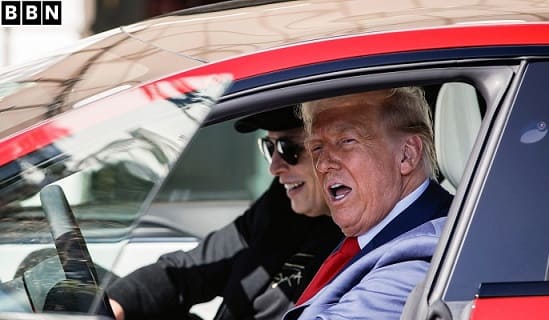Trump Eases Some Tariffs on Carmakers amid Industry Backlash
Trump Eases Some Tariffs on Carmakers – In a significant shift, former U.S. President Donald Trump signed two executive orders on Tuesday that offer limited relief to American carmakers from the sweeping tariffs that have strained the auto industry since their introduction.
While the core 25% tariff on imported vehicles remains in effect, the new rules will allow automakers such as Ford, General Motors (GM), and Stellantis to avoid some overlapping tariffs on imported components, including those previously applied to steel, aluminum, and certain goods from Canada and Mexico.
“A Little Flexibility” — But with a Warning
Speaking at a campaign rally in Michigan — the heart of America’s auto manufacturing — Trump framed the move as a gesture of goodwill with conditions.
“We gave them a little time before we slaughter them if they don’t do this,” he said, referring to his push for automakers to manufacture more parts within the United States.
Trump signed the executive orders aboard Air Force One, en route to mark his 100th day back in office.
WhatsApp Crosses 3 Billion Monthly Users – A Milestone Moment for Meta
Relief, But Only for Some
Under the revised rules, carmakers will be allowed to offset part of their tariff burden on imported parts — up to 15% of a vehicle’s suggested retail price in the first year, dropping to 10% in the second, and eliminated entirely in the third year. This relief is only available to companies that assemble cars in the U.S., and they must apply for it by providing detailed documentation.
Another key provision prevents companies from being hit with stacked tariffs. If a vehicle is already subject to the 25% auto tariff, it will now be exempt from additional levies on the same import — such as steel, aluminum, or regional-specific duties on imports from Canada and Mexico.
However, this does not protect suppliers, whose steel and aluminum imports will still incur tariffs — costs that are often passed on to automakers.
Auto Industry Still Faces Financial Pressure
Despite the limited relief, analysts warn that the tariffs are still raising car prices, affecting both new and used vehicle markets, and inflating repair costs and insurance premiums.
General Motors, which sells more vehicles in the U.S. than any other automaker, withdrew its previous profit forecast, citing economic uncertainty caused by the trade policies. “The prior guidance cannot be relied upon,” said GM CFO Paul Jacobson.
The company also postponed its quarterly earnings call, awaiting the final wording of the tariff changes.
A Pattern of Concessions?
The move to soften the auto tariffs comes shortly after the Trump administration exempted smartphones, computers, and semiconductors from China tariffs, following pushback from major tech companies like Apple.
Commerce Secretary Howard Lutnick said the tariff changes were the result of “direct conversations” with domestic automakers. “We’ve been in constant contact to make sure we got this exactly right,” he said.
Lutnick, a key player in recent tariff exemptions for various industries, called Tuesday’s deal “a major victory” for Trump’s trade policy. He also said the new rules give automakers a runway to adjust operations and demonstrate their commitment to investing in U.S. manufacturing.
Mixed Reactions from the Auto Sector
Automakers cautiously welcomed the relief. GM CEO Mary Barra said her company appreciated the “productive conversations” with the administration, noting that Trump’s leadership was “leveling the playing field” for U.S. businesses.
Stellantis Chairman John Elkann, whose company owns brands like Dodge, Jeep, and Chrysler, said the group appreciated the tariff measures but would still assess their impact on operations.
Ford CEO Jim Farley echoed a similar sentiment, expressing hope that ongoing talks with the administration could lead to further flexibility in trade rules.
Long-Term Challenges Remain
While the exemptions give automakers breathing room, analysts say two years isn’t enough for companies to overhaul global supply chains, and many components still can’t be manufactured in the U.S. at competitive prices.
Even vehicles built in the U.S. heavily depend on imported parts from Asia, including Japan, China, and South Korea — countries not covered by most exemptions.
“Relief today doesn’t fix the longer-term challenge,” analysts at Bernstein wrote. “U.S. car prices are heading higher just as economic momentum fades.”
Meanwhile, critics argue the administration’s strategy amounts to coercion. Veronique de Rugy, a senior fellow at the Mercatus Center, described the move as a “shakedown,” saying the tariffs created a crisis and the relief is conditional on promises of new investments.
Thanks for visiting Best Breaking News.

